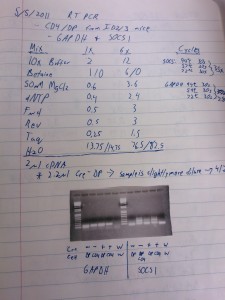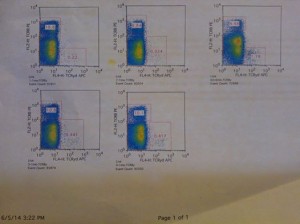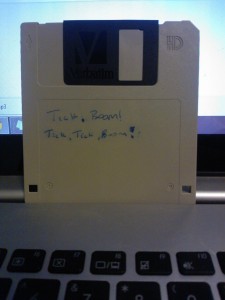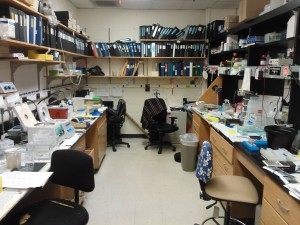I have had a fair amount of laboratory experience, whether it be from lab courses in high school, at Duke, or summer programs over the summer. During that time, I was pretty sure that I had mastered the art of pipetting and measuring, but I knew that lab research was much more than following the standardized procedures of TAs and Professors. No longer would I simply have a procedure to follow step by step; it was time to make my own procedure! (In the back of my head I was thinking of the Organic Synthesis problems from Orgo 1 and how much lab would be like that but this time with proteins). Of course, I knew thinking like this would lead me to disappointment; I’ve seen enough lab goers to realize that real-world research didn’t have the same half-hour leaps in discovery displayed in film. Nevertheless, my mind would not allow me to underestimate this summer’s experience. That’s turning out to be a pretty good choice so far.
Let me being by first say never underestimate the work and struggle of Ph.D. I work in Yuan Zhuang’s Immunology lab in the Duke Medical Center. My mentor, Ian Belle, and I focus our attention on studying the lymphocytes (white blood cells) of mice suffering from the autoimmune disease Sjogren’s Syndrome, a disease where the bodies own lympocytes attack the salivary glands and tear ducts, and manipulating the genes of the lymphocytes that correspond to the disease’s propagation and interruption. Upon hearing of this research, I couldn’t help but think about the movie Contagion, and hope that a cure would be on the way by the end of this summer. But my first struggle would be understanding the myriad of vocabulary and processes that were spouted from everyone, consisting of numerous acronyms, numbers mixed with letters, and code words. What I thought were already confusing lab documents were made even more confusing when put into actual application. Ian made a wise decision by detailing, and drawing, literally drawing, out the the processes and structures we’d be working with. Flow cytometry and TCR recombination would make little sense without those white board doodles. At this time I realized this summer, would much more for my educational benefit rather than significant gain for the lab.
Benchwork, was a saving grace from the new world of immunologic jargon. RT-PCR, a process used to increase the number of a few DNA strand exponentially, only required pipetting and math, easy enough stuff.

Gel Electrophoresis
Developing an agarose gel for electrophoresis was simple enough, and even after a few mice dissections, I was able to get the thymus out without puncturing the liver – I know not of such a grander success than that! However, I couldn’t for the life of me understand flow cytometry, so I left that to Ian.
Our lab schedule was sporadic, simply because it was completely up to Ian and I to determine our schedule. Some days we would focus primarily on genotyping, others were focused on collecting samples, and some consisted mostly of flow cytometry, and others benchwork. One day, in particular was dominated by benchwork and with benchwork comes waiting. A LOT OF WAITING. 5 minutes for a centrifuge, 10 for cooling, 2 for carbon dioxide, 20 for agarose gel solidification, hours for the PCR machine to finish its 18 cycles. LOTS OF WAITING. In those moments, I would ask Ian EVERY SINGLE QUESTION I HAD, for there were many. With those answers came understanding while some raised even more questions which he had time to get to because we were STILL waiting.
After, a week of benchwork, Q & A session, reading lab reports, spending hours dissecting those lab reports, by the end of the week, I finally fully understood what was going on. To fully disclose these findings would require much more time, and I fear I am running too long on this blog as it is. Wait for the chalks talks! With my new-found understanding, I could truly appreciate the scope of what the Zhuang lab had done to come to such conclusions. And with my new understanding came, the knowledge of flow cytometry (again, I know you’re eager to learn, but wait for the talk chalk!) and the creation of my first Flow Chart! (seen below).

With my new-found understanding also came with frustration, the frustration that I feel all scientist must feel. All this work and comprehension yet, cures, remedies, and procedures escape us. Furthermore, you can spend days, weeks, months even and amount to nothing of significance, except placing a variable you thought was important into the list of things that is unimportant.
All in all, I guess I was right in thinking that lab research wasn’t just the same procedural task; although monotonous task are necessary. Everyday, we take what we gained from days, weeks, months, years past and put it up to the test, we can change variables however we see necessary, and bring in any number of factors into play. It’s CREATIVITY in science, two things I never before thought could correspond. I was right to know this wouldn’t be like research in movies, where discoveries are made miraculously before they are required. There is not the highest of technology running every which way – in fact, Yuan has a habit of being a little cheap and old school for everything, something a I completely respect, but I found a Mac with the rainbow logo and a floppy disk!

In his lab, he is much more concerned with us being creative with out methods than spending money on tech that’s not absolute necessary or a lab that isn’t its cleanest.

Just as in research, expectations can vary drastically from reality, and realistically, I am having way more fun and learning much more than I ever thought I would. I expect that I’ll keep learning even more and having just as much fun, nevermind if the work becomes repetitive.
